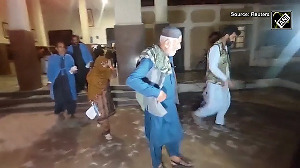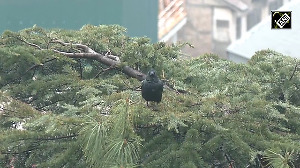British troops blasted their way into a home in northern England in what they said was a search for explosives,
and police conducted a series of raids linked to last week's London bombings.
Police said 500 people were evacuated from the area and the streets were cordoned off. Hours earlier, police
searched five residences elsewhere in Leeds as part of the investigation of Thursday's subway and bus bombings
that killed at least 52 people.
Metropolitan Police Commissioner Sir Ian Blair said the raids were connected to the massive investigation of Thursday's attacks on three subway trains and a bus.
Investigators search for clues | Slideshow: Terror strikes London
"There have been a series of searches carried out in Yorkshire. Those searches are still going on. There's very little else I can say at the moment, but this activity is directly connected to the outrages on Thursday," Blair said in an interview with British Broadcasting Corp. radio.
Metropolitan Police described the raids as part of an "intelligence-led operation."
Police sealed off a section of road in Leeds, according to Press Association, the British news agency. A red Volkswagen car, marked off with police tape, apparently attracted special attention, it said.
The families of those missing since the terrorist bombings, meanwhile, were enduring an agonizing wait Tuesday for word of the fate of their loved ones.
"I need to know, I want to protect him," said Marie Fatayi-Williams, who arrived from Nigeria to find out what happened to her immigrant son Anthony, 26. "How many tears shall we cry? How many mothers' hearts must be maimed? My heart is maimed at this moment."
Travel bookings to UK down 50%
The family of Michael Matsushita, a New Yorker who moved abroad in the spring of 2001, said it was likely he was dead. The 37-year-old left home Thursday to go to work and never returned.
"At this time, we've been told that there is virtually no possibility that he is alive," said David Golovner, a spokesman for Matsushita's family. "We realize the police wouldn't have told us that unless they were certain. We have given up, basically, any sort of extravagant theories about how he might still be alive."
Prime Minister Tony Blair promised authorities would hunt relentlessly for the bombers who hit three Underground trains and a double-decker bus on Thursday.
Police said their painstaking investigation was moving ahead, and warned that the death toll, which went from 49 to 52 on Monday, would rise. Some 700 were injured in the attacks; 56 of those remained hospitalized.
The names of two more victims were released Tuesday. The families of 30-year-old financial adviser Jamie Gordon
and Philip Stuart Russell _ whose 29th birthday would have been Monday _ said the two men were on the No. 30
bus that exploded near Tavistock Square.
So far, the names of four of the dead have been released.
The first of the dead was identified as Susan Levy, 53, of Hertfordshire outside London. Forensics experts have warned it could take days or weeks to put names to the bodies, many of which were blown apart and would have to be identified through dental records or DNA analysis.
Ian Blair said forensic experts were scouring every centimeter of the tunnel where a bomb exploded on board a Piccadilly line train, the deadliest of the four blasts. Police said they are also scrutinizing 2,500 closed-circuit television tapes taken from cameras around the explosion sites.
"This is the biggest crime scene in England's history," Ian Blair said, warning that the death toll would rise.
"They still have to get underneath the carriages, and it is possible they will find more" bodies.
Public transit officials said the number of passengers using London's vast bus and subway network, which handles 3 million people on a typical day, was back to normal Monday.
Sales of bicycles in London have climbed since Thursday's Tube and bus bombings as workers look for alternatives to public transport, the capital's biggest cycle retailer said today.
"On Thursday we sold about four times more bikes than we would normally," he said. "Since then we have seen sales of around double what they usually would be. Obviously this increase has a direct correlation to something and we pretty much know what that is."
The prime minister said no specific intelligence was available that might have helped authorities thwart the attacks, answering critics who have questioned the government's vigilance and readiness.
'Blasts will shake British complacency'
"Our country will not be defeated by such terror," he told the House of Commons. "We will pursue those responsible wherever they are and will not rest until they are identified and ... brought to justice."
Police were analyzing the 2,000 phone calls to an anti-terrorist hot line, 115,000 calls to police, and complex forensic evidence from the scenes of the subway and bus attacks, where many of the victims were blown apart.
Help came from abroad, too, as intelligence officials and detectives from some two dozen countries -- including Spanish investigators who worked on the Madrid bombings -- met over the weekend to discuss leads.






 © 2025
© 2025